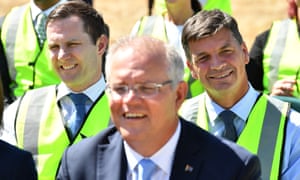Angus Taylor tells union leaders the opposition’s 45% reduction target will lead to a $9,000 wages cut
The Morrison government, which is battling a persistent internal
fracture on energy policy, is attempting to foment divisions between
Labor and the union movement over the opposition’s 45% emissions
reduction target in the run up to the election.
The energy minister Angus Taylor, has written to trade union leaders claiming the 45% economy-wide emissions reduction target will lead to wages being cut by $9,000.
The source for Taylor’s claim is a summary of as yet unreleased modelling by BAEconomics about the impact of the 45% target, which was handed to The Australian newspaper in late February.
The summary of the unreleased modelling says the government’s target of 26-28% emissions reduction by 2030 will reduce average real annual income for a full-time worker by around $2,000. Under the high target, the summary points to a projected fall in real annual wages of “around $9,000 per year by 2030”.
In the new form letters to union officials, Taylor advises them to to seek “urgent clarification” from Bill Shorten about the impact of a 45% target on the wages outcomes of their members.The energy minister Angus Taylor, has written to trade union leaders claiming the 45% economy-wide emissions reduction target will lead to wages being cut by $9,000.
The source for Taylor’s claim is a summary of as yet unreleased modelling by BAEconomics about the impact of the 45% target, which was handed to The Australian newspaper in late February.
The summary of the unreleased modelling says the government’s target of 26-28% emissions reduction by 2030 will reduce average real annual income for a full-time worker by around $2,000. Under the high target, the summary points to a projected fall in real annual wages of “around $9,000 per year by 2030”.
Taylor says the Labor leader has elected to make the coming federal election a “referendum on wages”, but the opposition’s climate policies will have an negative impact on earnings. “Every Australian worker deserves to know how Labor is going to reach their economy wrecking targets,” the energy minister said.
Erwin Jackson, the director of policy at the Investor Group on Climate Change, has also pointed out that previous modelling indicates that the economy continues to grow even with ambitious pollution targets, just at a slightly slower rate. The summary from BAEconomics suggests the economy will continue growing under a 45% target at around 2.3% per year over the decade to 2030 compared to a rate of 2.9%.
While there has been no sign union leaders are troubled by a 45% target, there have been public tensions between Labor and the union movement over the party’s position on the Adani coal mine.
Labor will come under increasing scrutiny as it prepares to release the remainder of its climate change policies, which are expected in the coming weeks.
Labor has already released its policy on the energy sector. The opposition is expected in the coming weeks to confirm specific measures to reduce pollution in heavy industry, transport and agriculture, and to outline whether it intends to use carry-over credits from the Kyoto period to meet the Paris 2030 target, and whether it will use permits to help with the abatement task.
The government’s attempts to apply political pressure to Labor comes as divisions continue within the Coalition about whether the government should sign up to taxpayer underwriting of new coal plants.
The backdrop to the running battle is escalating voter concern about the impact of climate change, which is clear in major party polling. School students are expected to strike on Friday to draw attention to the climate issue.
The issue has blown up spectacularly in government ranks over the past week, with Nationals brawling with Liberals and among themselves about what projects should be supported by the government underwriting program.
Taylor has confirmed the Morrison government is continuing to assess new coal-generation projects despite strong pushback from moderate Liberals, but he says taxpayers will only support projects that are “viable”.
Nationals want the government to produce a shortlist of projects before the election, but many Liberals are completely opposed to the government nominating taxpayer support for a new coal project before the coming election, fearing it will cost them electoral support.
On Thursday, the government’s most senior conservative, Peter Dutton, joined Liberal colleagues in arguing the Morrison government should not be in the business of building coal-fired power stations, and he put a question mark over whether taxpayers should support upgrades to existing plants.
Dutton said the government was not opposed to providing support to coal projects, but he was opposed to building them, because money to build that infrastructure would take away opportunities to build new roads and tunnels.
“We’ve got taxpayers’ money to spend, the question is whether the federal government should be building a coal-fired power station. I don’t agree with that. I don’t think we should be,” Dutton said.
While saying the government was not opposed to assisting coal, Dutton also indicated he wasn’t in favour of assisting projects with upgrades. “You’ve got power stations now that will be asking for taxpayers’ money, to upgrade.
“The question is whether people want to pay more taxes or whether you are going to use taxpayer money, instead of building that new road or that tunnel.”

No comments:
Post a Comment